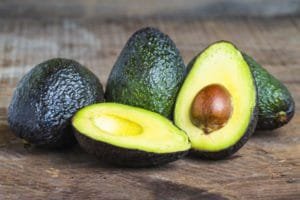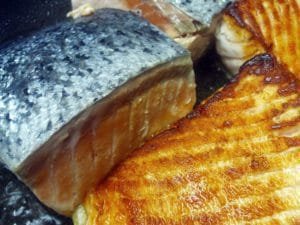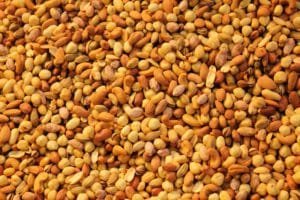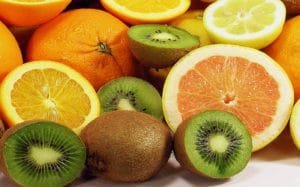Foods to Reduce Anxiety
Let’s face it. These are highly anxious times for most people. As if we didn’t have enough normal anxiety to deal with on a regular basis, the current environment lends itself to anxiety overload. And “anxiety” is considered a medical disorder, similar to for example, high blood pressure being a medical disorder. And while there is no definitive cure, there are steps that can be taken to minimize and reduce our anxiety level. So what we decided to do is put together a short list of foods that help reduce anxiety, for everyone to benefit from during these times and beyond.
Anxiety – Prevalence and Symptoms

Anxiety is currently classified as a mental illness. And that is probably because people in medicine haven’t figured out any other organ or physiologic function which can cause this disease. Now whether you (or I) agree with this classification or not, one thing is clear. Anxiety is for sure a medical condition, but a mental disorder? Nevertheless, it affects almost 20% of the population. Given its prevalence though, only about 60% of these patients seek care, meaning there a lot of people with un-diagnosed anxiety walking around and dealing with it on their own. One reason for this maybe due to the fact that people may not want to be diagnosed with mental illness of any nature because of external or internal beliefs. Another reason is people have come to accept feeling anxious as a normal feeling.
Anxiety can cause symptoms like: chest tightness, muscle tension, heart palpitations, elevated heart rate, increased body temperature, tremors, difficulty concentrating, fear, tension and irritability. If you have been dealing with anxiety you know these symptoms well. Some level of anxiety is healthy (i.e. feeling anxious when taking a test), but too much anxiety can be detrimental to our immune system and health.
Treating Anxiety
If you have been diagnosed with anxiety disorder chances are you have been given some exercises and possibly even some medications to combat this disease. Valium (or Xanax) is a common anti-anxiety drug which is prescribed for people with anxiety. There are also a number of other drugs with rather serious side effects which are prescribed as well. The problem with this approach is that it primarily focuses on relieving the symptoms by synthetic pills and drugs with side effects which make one wonder, is this a medication or a poison?
Our body responds to the environment and surroundings daily. When it’s hot, we sweat. When it’s cold we shiver. It also responds to what we put in it. This applies to both what we ingest and what is artificially introduced into our system (i.e. injections like flu shots or other medications, or a cut that serves as an open door for bugs to enter). You eat a high salt diet and chances are you’ll develop hypertension over time. You love seafood? Chances are your body will have elevated mercury levels as well as high cholesterol. By the same token, when we eat good foods, we do not develop these kinds of issues. So the question is do foods have an impact on our anxiety? And the answer is yes. Eating more of these foods will help reduce your anxiety level naturally, with none of the harmful side effects of synthetic medications.
Foods Help Reduce Anxiety
If you still don’t agree with the concept of our diet having a long term impact on our health, at least consider its proven short term impact. If you eat something that has gone bad without realizing it, your body will respond by rejecting it (along with a lot of fluids and such) out of any possible orifice. If you are allergic to peanuts and unknowingly eat something that contains peanuts, then once again your body reacts by an allergic reaction. So let’s focus on this as if the benefits of the following anxiety-relief-foods were only short term. The following foods are listed in no particular order.
- Dark Chocolate –
 Aside from tasting great, dark chocolate is rich in anti-oxidants (which help reduce aging). In some studies it has been shown to reduce the level of “stress” hormone in our body. Not only does it taste good, it’s good for you. Just watch the quantity and the sugar content. Invest in good quality dark chocolate to truly reap its health benefits.
Aside from tasting great, dark chocolate is rich in anti-oxidants (which help reduce aging). In some studies it has been shown to reduce the level of “stress” hormone in our body. Not only does it taste good, it’s good for you. Just watch the quantity and the sugar content. Invest in good quality dark chocolate to truly reap its health benefits. - Carbohydrates & Fibers – Carbohydrate is a fancy word that covers a wide group of foods such as rice, bread, pasta, cookies, etc. Fibers are also carbohydrates, but a large percentage of their content is not absorbed into our body. That is why anyone with digestive health issues (especially bowel movements) are placed on a high fiber diet to help things move along. The trick here is to eat more “complex carbohydrates”. Meaning avoid simple carbohydrates like sugar and cookies. Instead opt for non-processed, non-refined forms. Some examples are: brown rice, sweet potatoes and whole grain bread. It’s been shown that consuming carbs helps our body release “serotonin” which is a stress-reducing hormone. Fiber is necessary for a healthy functioning digestive system as discussed. And research has shown that a healthy digestion helps reduce the stress on our body at a physiological level (e.g. reduction in oxidative stress).
- Avocados –
 This fruit contains an amazing amount of omega-3 fatty acids. Avocados have been shown to boost concentration, decrease stress and improve the mood. No matter how you eat it (guacamole or sliced), it’s full of good stuff. And it tastes good too.
This fruit contains an amazing amount of omega-3 fatty acids. Avocados have been shown to boost concentration, decrease stress and improve the mood. No matter how you eat it (guacamole or sliced), it’s full of good stuff. And it tastes good too. - Fish –
 Fish is rich in omega-3 fatty acids along w/ the healthy oil that our body needs. If you don’t like fish there are other foods that you can substitute. Seaweed, chia seeds, walnuts, flax seed and fish-oil supplements are some examples. Not all forms of fish are healthy though. Fatty fish like Herring, Salmon, Tuna top the healthy fish list while Shark and Swordfish may contain higher levels of mercury and should be avoided.
Fish is rich in omega-3 fatty acids along w/ the healthy oil that our body needs. If you don’t like fish there are other foods that you can substitute. Seaweed, chia seeds, walnuts, flax seed and fish-oil supplements are some examples. Not all forms of fish are healthy though. Fatty fish like Herring, Salmon, Tuna top the healthy fish list while Shark and Swordfish may contain higher levels of mercury and should be avoided. - Milk – The main ingredient here is calcium. Not only is a calcium rich diet good for the health of our bone, it also helps reduce depression. If you don’t like milk or are lactose intolerant, there are other substitutes like: yogurt, cheese, canned salmon, almonds, sunflower seeds and green leafy vegetables.
- Nuts –
 Not only are nuts like almonds, pistachios and walnuts rich in Vitamin B, they also contain high levels of good oil/fat that our body needs. Nuts are also high in magnesium which has been linked to reduced anxiety.
Not only are nuts like almonds, pistachios and walnuts rich in Vitamin B, they also contain high levels of good oil/fat that our body needs. Nuts are also high in magnesium which has been linked to reduced anxiety. - Citrus –
 Studies have shown that high levels of vitamin C help ease stress. Not only are they good for your immune system, they help reduce anxiety too. Examples are strawberries, oranges and grape fruits.
Studies have shown that high levels of vitamin C help ease stress. Not only are they good for your immune system, they help reduce anxiety too. Examples are strawberries, oranges and grape fruits. - Probiotics – We need these for healthy functioning guts. Probiotics help our gut (digestive system) in many ways. And research has also shown that improved digestive health helps reduce stress and anxiety. Probiotics can be taken in pill form or from foods like yogurt, fermented yogurt drinks and kombucha.
In Closing
So there you have it. A good list of natural and healthy foods that can help our body in many ways and reduce our stress and anxiety levels. Mix these in with your regular diet and start improving your stress and anxiety level. Less stress and anxiety helps our immune system remain stronger and we can all use a stronger immune system, especially now-a-days.

 Aside from tasting great, dark chocolate is rich in anti-oxidants (which help reduce aging). In some studies it has been shown to reduce the level of “stress” hormone in our body. Not only does it taste good, it’s good for you. Just watch the quantity and the sugar content. Invest in good quality dark chocolate to truly reap its health benefits.
Aside from tasting great, dark chocolate is rich in anti-oxidants (which help reduce aging). In some studies it has been shown to reduce the level of “stress” hormone in our body. Not only does it taste good, it’s good for you. Just watch the quantity and the sugar content. Invest in good quality dark chocolate to truly reap its health benefits. This fruit contains an amazing amount of omega-3 fatty acids. Avocados have been shown to boost concentration, decrease stress and improve the mood. No matter how you eat it (guacamole or sliced), it’s full of good stuff. And it tastes good too.
This fruit contains an amazing amount of omega-3 fatty acids. Avocados have been shown to boost concentration, decrease stress and improve the mood. No matter how you eat it (guacamole or sliced), it’s full of good stuff. And it tastes good too. Fish is rich in omega-3 fatty acids along w/ the healthy oil that our body needs. If you don’t like fish there are other foods that you can substitute. Seaweed, chia seeds, walnuts, flax seed and fish-oil supplements are some examples. Not all forms of fish are healthy though. Fatty fish like Herring, Salmon, Tuna top the healthy fish list while Shark and Swordfish may contain higher levels of mercury and should be avoided.
Fish is rich in omega-3 fatty acids along w/ the healthy oil that our body needs. If you don’t like fish there are other foods that you can substitute. Seaweed, chia seeds, walnuts, flax seed and fish-oil supplements are some examples. Not all forms of fish are healthy though. Fatty fish like Herring, Salmon, Tuna top the healthy fish list while Shark and Swordfish may contain higher levels of mercury and should be avoided. Not only are nuts like almonds, pistachios and walnuts rich in Vitamin B, they also contain high levels of good oil/fat that our body needs. Nuts are also high in magnesium which has been linked to reduced anxiety.
Not only are nuts like almonds, pistachios and walnuts rich in Vitamin B, they also contain high levels of good oil/fat that our body needs. Nuts are also high in magnesium which has been linked to reduced anxiety. Studies have shown that high levels of vitamin C help ease stress. Not only are they good for your immune system, they help reduce anxiety too. Examples are strawberries, oranges and grape fruits.
Studies have shown that high levels of vitamin C help ease stress. Not only are they good for your immune system, they help reduce anxiety too. Examples are strawberries, oranges and grape fruits.